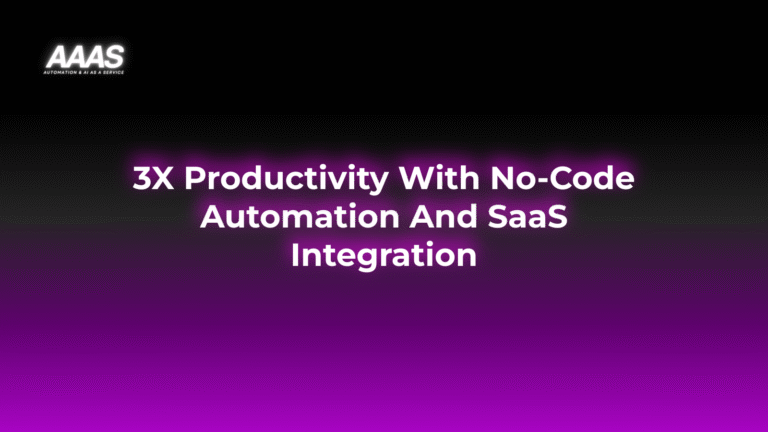Leveraging No-Code Automation and SaaS Integration for Streamlined Business Workflows

Market Problem: Inefficiency in Business Workflows
Modern businesses face mounting pressure to do more with less. Manual, repetitive tasks—such as data entry, invoice processing, and team notifications—consume critical employee hours. According to McKinsey, over 60% of occupations could automate at least one-third of their activities. Yet, custom automation is too costly, and manual integration drains productivity.
Solution & Benefits of No-Code Automation and SaaS Integration
No-code automation platforms like Zapier, Make (formerly Integromat), and Microsoft Power Automate bridge disparate SaaS tools—without writing a single line of code.

- Immediate Efficiency: Automate data movement, sync records, handle notifications—in hours, not weeks.
- Cost Reduction: Drastically lower development and maintenance costs. Pay only for what you use; avoid custom engineering.
- Increased Productivity: Reallocate team time to innovation and high-value work.
- Scalable & Flexible: Integrate 5,000+ SaaS apps; adapt quickly to new tools as your stack evolves.
Real World Use Cases
- Sales & Marketing: When a new lead fills a web form, automatically create a CRM record, notify the sales rep in Slack, and schedule a personalized email follow-up.
- Finance: Sync invoices from an accounting app (like QuickBooks) to Google Sheets, and alert the finance team to overdue payments.
- HR Onboarding: New hire in your HRIS? Instantly provision accounts in G Suite, schedule onboarding meetings, and assign training—all without manual input.
- E-commerce: When an order is placed, update inventory, trigger email updates, and schedule fulfillment—all seamlessly.
See more examples of top use cases for different industries.
Technical Details and Architecture
No-code automation tools utilize API connectors to interact with SaaS applications, allowing users to:
- Trigger events: e.g., New row added, form submitted.
- Define actions: e.g., Create record, send notification, update spreadsheet.
- Use conditional logic, branching, and multi-step workflows.
| Component | Description |
|---|---|
| Triggers | Initiate workflows by detecting changes/events |
| Actions | Define what should happen in connected SaaS apps |
| Conditions & Filters | Process logic for branching |
| API Integration | Secure, token-based authentication with SaaS providers |
| Error Handling | Automatic retries, alerting options, workflow logs |
Top tools provide version control, scheduling, monitoring, and error tracking dashboards.
Comparison: No-Code Automation vs. Alternatives
| Solution Type | No-Code Platforms | Custom Code | Manual Processes |
|---|---|---|---|
| Deployment Speed | Hours/days | Weeks/months | Instant |
| Flexibility | High for standard integrations | Very high | Manual! |
| Maintenance Cost | Low (platform handles it) | High (developers needed) | Hidden (operational costs) |
| Technical Skill Required | Low | Advanced | None |
| Scalability | Easy to modify and scale | Complex, slow | Poor |
Pricing Comparison Table
| Platform | Free Plan | Paid Plan (Starts At) | Key Features |
|---|---|---|---|
| Zapier | Yes | $19.99/mo | Easy UI, 6,000+ app integrations, multi-step zaps |
| Make | Yes | $9/mo | Visual builder, advanced logic, budget-friendly |
| Microsoft Power Automate | Trial | $15/user/mo | Deep Microsoft 365 integration, RPA capabilities |
| Custom Code (Developer) | No | $1000+/project | Fully bespoke, high flexibility |
For large-scale enterprise options, see detailed comparisons at G2 BPM reviews.
ROI-Focused Practical Examples
- Marketing Agency: By automating lead tracking across multiple channels, one agency saved 25 hours/month and improved conversion times by 47%, resulting in a reported ROI of $1,800/month per workflow.
- Finance Team: Automated invoice reminders reduced overdue payments by 60%, cutting debt collection costs by $14,000 annually.
- SMB Operations: Using Make automations, a 10-person SaaS startup replaced 4 hours/day of manual copy-paste, saving $10,000+ per year on labor costs.
Step-by-Step Setup Guide
- Map Repetitive Tasks: List all manual, routine processes.
- Choose Your No-Code Platform: Assess app coverage, scalability, and ease-of-use. (e.g., Zapier, Make, Microsoft Power Automate)
- Connect SaaS Tools: Link your apps—such as Google Workspace, Slack, Salesforce, Xero—using secure tokens.
- Build Your Workflow:
- Select your trigger (e.g., new form entry).
- Add actions (e.g., create task, send email, update CRM).
- Apply logic, branches, filters as needed.
- Test and Monitor: Use platform-provided sandbox/testing tools. Monitor execution and error logs.
- Iterate and Expand: Add more automations over time for greater savings.
Pros & Cons
| Pros | Cons |
|---|---|
|
|
Expert Tips for Success
- Pilot with a single workflow: Prove ROI, then expand organization-wide.
- Standardize tool usage: Ensure teams use approved SaaS apps for simpler integrations.
- Monitor regularly: Set up alerts for errors or failed automations to minimize downtime.
- Stay informed: Review updates from automation vendors for new feature releases and security improvements.
- Document automations: Maintain clear documentation so team members understand each process and its triggers.
FAQ
- What is no-code automation?
- No-code automation allows users to automate workflows between SaaS apps using visual interfaces, eliminating the need for software development skills.
- Is my data secure with no-code integrations?
- Reputable platforms use secure tokens (OAuth), data encryption, and comply with regulations such as GDPR. Always confirm your vendor’s security credentials.
- Can I integrate custom or niche SaaS tools?
- Many platforms support webhooks and custom API calls for unsupported apps, offering high flexibility.
- How does pricing typically work?
- Most no-code automation platforms use tiered SaaS plans based on number of tasks, frequency, and connected apps. Free tiers are often available.
- Where can I learn more about best practices?
- See resources from Zapier’s Automation University and Make’s official blog.
References & Citations
- McKinsey: Automation and ROI
- Zapier: How to Quantify Automation ROI
- Gartner: SaaS Integration Platform
- G2 BPM Platforms
- Make: No-Code Automation Blog
Last updated: 2025-07-29T09:00:37.011Z








